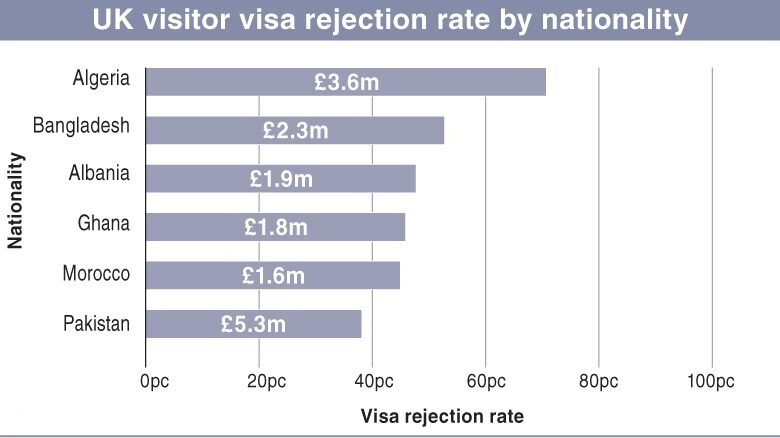
-
In 2023, around 50 percent of Schengen visas from Pakistan were rejected, with €3.344 million spent on applications.
-
The UK collected £44 million in rejected fees, which are non-refundable regardless of the outcome, with African and Asian countries bearing 90 percent of the costs for rejected Schengen visas.
-
Countries with high rejection rates for UK visa applications include Nigeria, Pakistan, Bangladesh, and Algeria, resulting in high costs (£5.8 million, £5.3 million, £2.3 million, and £3.6 million, respectively).
The United Kingdom (UK) and Schengen countries have generated millions of pounds and euros in fees from rejected visa applications from Pakistan, reveals a new research published this month.
The analysis released by Lago Collective, a community of researchers, policymakers, and designers, shows that Pakistanis spent £5.3 million on rejected UK visa applications, with close to 40 percent of applications rejected from Pakistan in 2023.
In the same year, around 50 percent of Schengen visas from Pakistan were also rejected, with €3.344 million spent on applications.
The data, published in collaboration with EU observer, reveals that EU governments collected €130 million per year in fees from rejected visa applications, which were labeled as ‘reverse remittances’.
The analysis, compiled by Marta Foresti and Otho Mantegazza at Lago Collective, highlighted that the cost of Schengen visa rejections in 2023 amounted to €130 million.
“Visa inequality has very tangible consequences, and the world’s poorest pay the price. You can think of the costs of rejected visas as ‘reverse remittances’, money flowing from poor to rich countries,” Foresti said in a statement to Dawn. “We never hear about these costs when discussing aid or migration; it is time to change that.”
The rejection rate for short-term visa applications from Pakistan is very high, at approximately 40 percent for both Schengen countries and the UK, resulting in significant costs for all involved. This is surprising given the multiple ties between Pakistan, Europe, and the UK.
“Yet the challenges faced by Pakistani nationals to reach Europe through legal means became tragically clear a year ago when hundreds died in the Greece boat capsize. People have no choice but to resort to dangerous journeys,” Foresti added. Foresti, the founder of Lago Collective and a senior visiting fellow at ODI, emphasized the dire situation.
The EU observer report indicated that the total sum is likely to increase in 2024 due to the increase in the visa application fee to travel to the EU, which will rise from 80 to 90 for adults starting June 11.
It also highlighted that the UK collected £44 million in rejected fees, which are non-refundable regardless of the outcome, with African and Asian countries bearing 90 percent of the costs for rejected Schengen visas.
In a piece for LSE blogs last year, Foresti noted, “Visa regimes are not equal or reciprocal. An Italian national can obtain a visa to Sierra Leone on arrival for £30. A Sierra Leonean wishing to travel to Italy for a business meeting must undertake two separate trips to the Italian Consulate in Abidjan, Cote d’Ivoire, over several weeks at eye-watering costs.”
The analysis notes that the visa application fee for short-term Schengen visas is €80 and £100 for the UK equivalent. Countries with high rejection rates for UK visa applications include Nigeria, Pakistan, Bangladesh, and Algeria, resulting in high costs (£5.8 million, £5.3 million, £2.3 million, and £3.6 million, respectively).
Visa application fees are increasing to €90 for Schengen/Europe and £120 for the UK. This will lead to significant increases in rejected visas in 2024, further exacerbated by the emphasis on tightening migration in many European countries where elections are taking place.
In a statement, Lago said, “These costs are just the tip of the iceberg: in most cases, applicants pay more than the basic application fee, with private agencies involved in processing visa applications and brokers providing additional services along the way. The costs of not being able to travel for business and leisure also result in significant losses for all those involved.”
Source: Dawn.com













